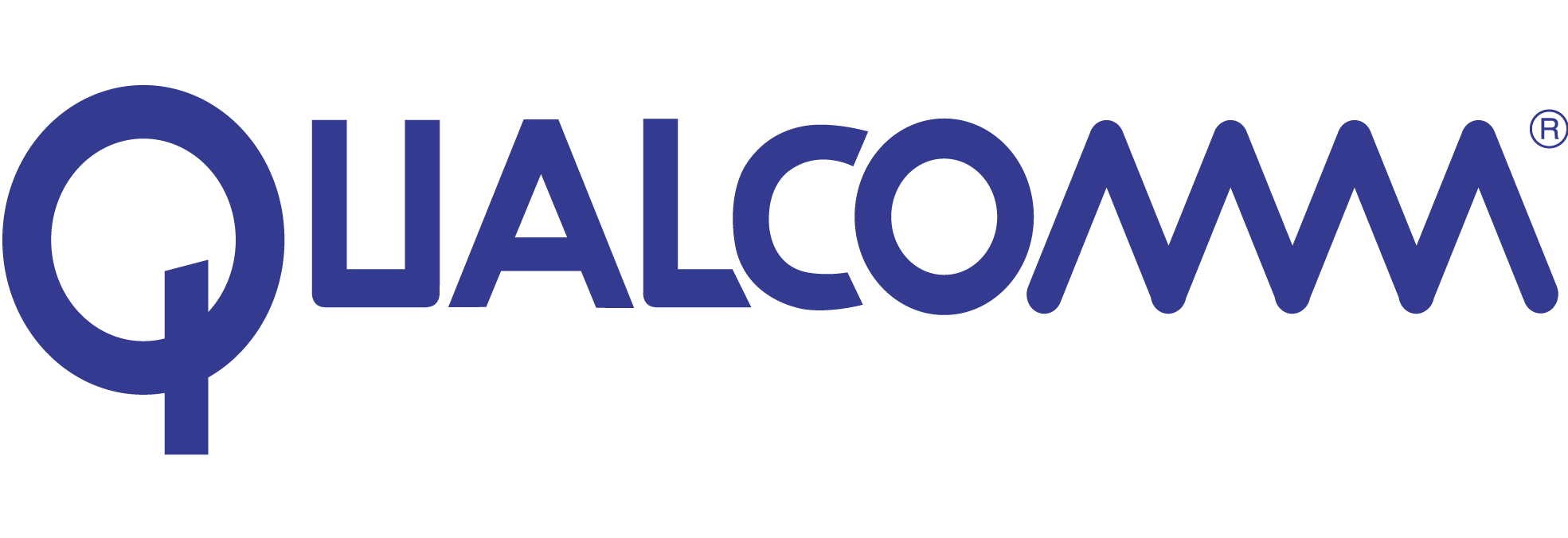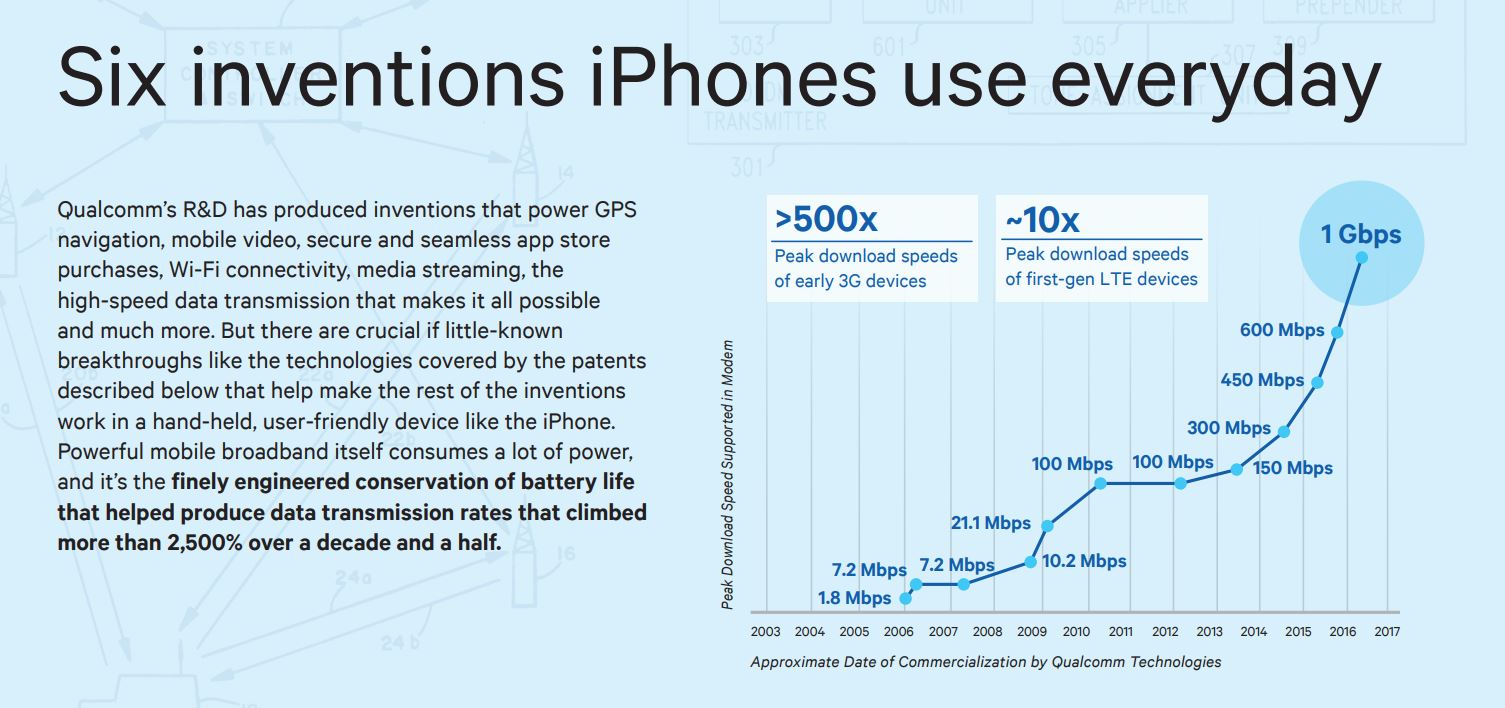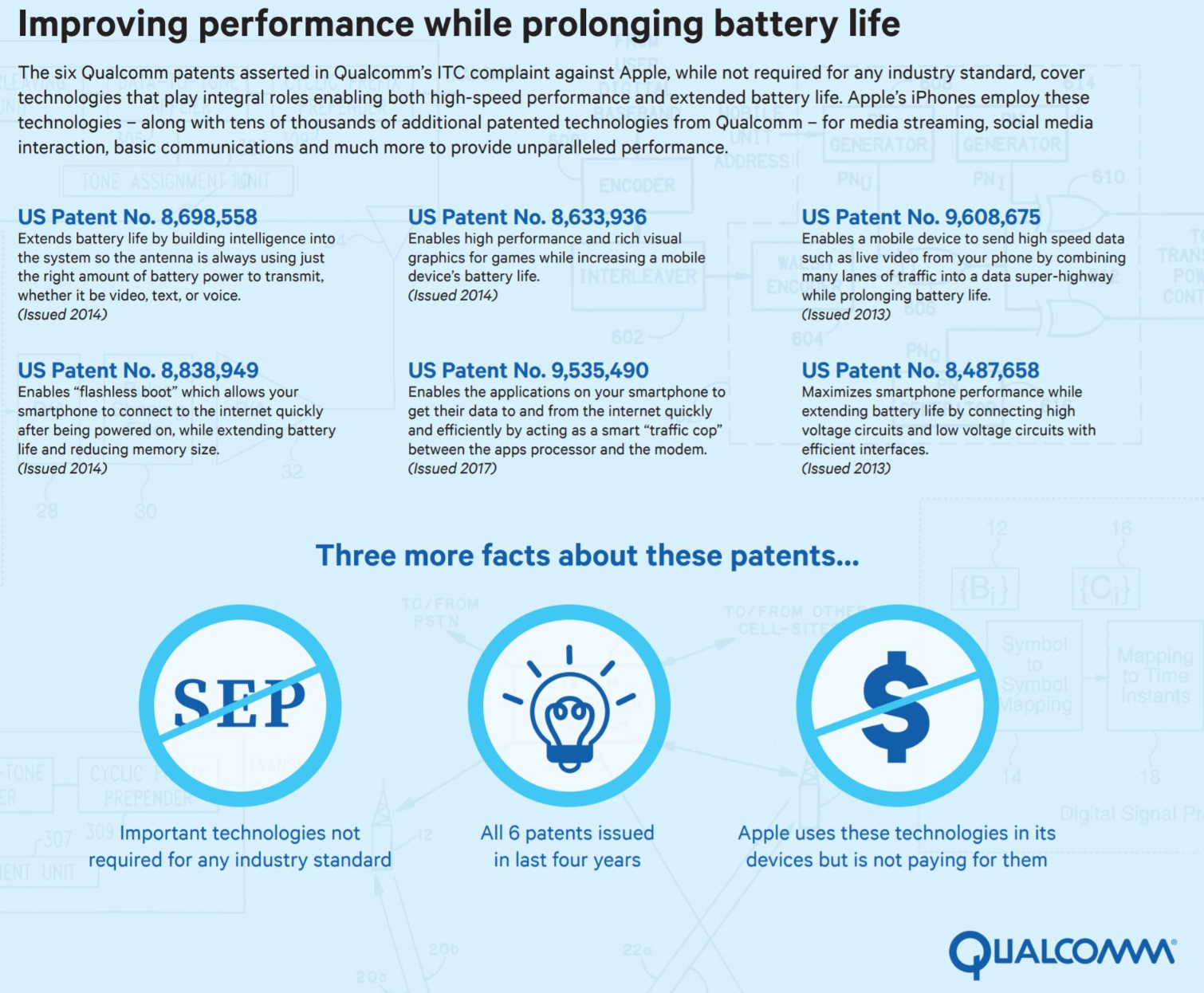Qualcomm Seeks To Halt US Import, Sales Of Apple iPhone
Update: 8:20 pm PT: Qualcomm provided a couple of clarifying statements indicating that its actions are related to iPhones that use baseband processors other than the ones provided by Qualcomm affiliates, and that its limited exclusion order pertains to future devices coming into the U.S. We have added those notes in the appropriate sections below.
The legal battle between Qualcomm and Apple is heating up. Qualcomm is seeking to block the importation and sale of Apple iPhones and other products, alleging that they infringe on six Qualcomm technology patent, mostly related to extending battery life.
Qualcomm and Apple have been embroiled in a contentious legal battle over technology royalty fees for most of this year. Apple's actions have sought to make a direct impact on Qualcomm's revenues, and the chip maker's latest move would be an audacious strike back if it were to succeed. How in the world did we get here?
In January, Apple filed lawsuits in the United States and in China alleging that Qualcomm's royalty fees are too high and the license agreements too restrictive. The lawsuits seek $1 Billion and 1 Billion Yuan in damages, respectively. During an earnings call the following week, Apple CEO Tim Cook explained that he doesn’t like resorting to litigation, but he “didn’t see another way forward."
As you can imagine, Qualcomm doesn’t agree with Apple’s stance. Don Rosenberg, Qualcomm’s executive vice president and general counsel provided a statement following the second Apple legal filing.
“These filings by Apple's Chinese subsidiary are just part of Apple's efforts to find ways to pay less for Qualcomm's technology,” said Rosenberg. “Apple was offered terms consistent with terms accepted by more than one hundred other Chinese companies and refused to even consider them. These terms were consistent with our NDRC Rectification plan. [...] Qualcomm is prepared to defend its business model anywhere in the world. We are proud of our history of contributing our inventions to the development and success of the mobile communications ecosystem."
In April, Qualcomm filed a counterclaim against Apple, seeking the court's intervention in compelling Apple to adhere to the agreements between the two companies.
Get Tom's Hardware's best news and in-depth reviews, straight to your inbox.
Later that month, Qualcomm said that Apple had withheld royalty payments from manufacturers for work done in the first quarter of 2017, which prevented the manufacturers from paying their licensing fees to Qualcomm. In May, Qualcomm revealed that four iOS device manufacturers—Foxconn, Pegatron Corporation, Wistron Corporation, and Compal Electronics—had refused to pay technology licensing fees at the behest of their client (Apple). Apple, Qualcomm said, was refusing to pay for the company's technology while the legal battle unfolds. Those companies rely heavily on Apple’s business, naturally.
Today, Qualcomm pushed further. The company filed a complaint with the United States International Trade Commission (ITC) alleging that Apple “has engaged in the unlawful importation and sale of iPhones.” Qualcomm’s complaint suggests that the Apple iPhone infringes on up to six of Qualcomm’s patents, and the company is seeking a Limited Exclusion Order (LEO), which would bar Apple from importing iPhones and other unnamed products into the Unites States. Qualcomm clarified that the company is seeking the LEO against iPhones that use cellular baseband processors other than those supplied by Qualcomm’s affiliates.
“Qualcomm’s inventions are at the heart of every iPhone and extend well beyond modem technologies or cellular standards,” said Don Rosenberg, executive vice president and general counsel for Qualcomm. “The patents we are asserting represent six important technologies, out of a portfolio of thousands, and each is vital to iPhone functions. Apple continues to use Qualcomm’s technology while refusing to pay for it. These lawsuits seek to stop Apple’s infringement of six of our patented technologies.”
Furthermore, Qualcomm is seeking a Cease and Desist Order, which would prevent Apple from selling the hardware that is already stateside and from “marketing, advertising, demonstration, and warehousing of inventory for distribution and use of those imported products . . . " A Qualcomm spokesperson said that the limited exclusion order is for future devices, so anyone who currently owns an iPhone will not be impacted.
Which Patents Is Apple Allegedly Infringing On?
Qualcomm maintains that the latest iteration of the iPhone infringes on Qualcomm’s battery life conservation technology (US Patent No. 8,698,558; US Patent No. 8,633,936; US Patent No. 9,608,675; US Patent No. 8,487,658, US Patent No. 8,838,949). The company provided an infographic (pictured partially above, with the patents described briefly below). The company also believes that the iPhone infringes on US Patent No. 9,535,490, which “enables the applications on your smartphone to get their data to and from the internet quickly and efficiently by acting as a smart ‘traffic cop’ between the apps processor and the modem.”
The battle between Apple and Qualcomm could go on for some time. Qualcomm said it expects an ITC investigation by August, with a potential trial beginning next year.
We've also reached out to Apple for comment and will add any statements from the company when we hear back.
Kevin Carbotte is a contributing writer for Tom's Hardware who primarily covers VR and AR hardware. He has been writing for us for more than four years.
-
virtualban I would be tempted to go with the defense of Qualcomm like this:Reply
Apple might be our real competitor, with whom we actually have to compete and their loss is our gain, unlike the small fish that swim around us. This competitor we do not wish to aid, so, we are giving it our work and IP at higher price because if we must sell out our soul, it should provide more return, to compensate having to aid our direct competitor that we don't even like. Next time they should build the wheel all over again and hope to compete with our superior version, or go die in a fire.
This is my anti-apple stance speaking, since it brings the gut feeling that the system is being arranged so that you cannot even refuse collaboration with entities of direct competition. Maybe one should not be allowed to refuse service in the market. Maybe one should. But Apple definitively is one big litigation mess of a company, with whom if you don't collaborate in the submissive stance you get mistreated. -
Joe Black Well... Apple started it. If they want to sell stuff with other's people's patents in them then they should pay the royalties like everybody else.Reply
Let's recap some of Apple's litigation victories...
Awarded $1Bn vs Samsung for patents on “bounce back” scrolling, pinch and zoom navigation and tap to zoom features. (not even actual hardware technology, but rather simply touch browsing methods)
Inport ban vs HTC w.r.t. functionality to embed phone numbers in such a way that users can tap and call (although this is literally the equivalent of a hyperlink that lets you initiate a call - simple formatting of text)
$120mil vs Samsung for Apple's patent on slide to unlock functionality.
So Apple has been winning lawsuits against competitors based on patents for simple input and formatting methods. Things a toddler can dream up (but apparently not use since Apple were awarded patents by some idiot), but they do not want to pay royalties on actual physical and driver level tech patents.
... methinks they need some of their own medicine. I'm only saying this because Apple's frivolous litigation has often irritated me. -
therealduckofdeath They can't "allegedly" be doing something if they've agreed to a licensing deal for the product for years before stopping paying for it. That's plain theft.Reply
It is indeed their choice not to pay for something, but then they're also required to not keep selling said product and stuffing their pockets with pure profits.
Samsung, for instance, is also aware of this patent problem in the US. They're dealing with it the legal way. Paying the full licence fee by selling compliant products in the US, while selling a different product everywhere else.
Apple is going to lose this one, big. -
10tacle Reply19909685 said:... methinks they need some of their own medicine. I'm only saying this because Apple's frivolous litigation has often irritated me.
Boom. You can drop the mic. The irony is that many Apple MAC buyers are as such being in protest of Microsoft's business practices. But I will say this: most Apple owners I know, be it with iPhones or iPads, are not very tech savvy. They are the type who tend to lean towards easy access and use solutions. -
psiboy So the worlds most filthy rich company with billions of cash sitting in the bank don't want to pay for licenece agreements they agreed to and signed? Sounds the a childish temper tantrum from the worlds biggest thieves! Apple you signed the agreement, pay the royalties renegotiate when the contract is up for renewal like a normal business. Apple = Worlds biggest corporate thieves and bustards!Reply -
falchard What did Apple think would happen when it told it's suppliers to stop paying Qualcomm licensing fees?Reply -
randomizer Reply19910993 said:But I will say this: most Apple owners I know, be it with iPhones or iPads, are not very tech savvy. They are the type who tend to lean towards easy access and use solutions.
I'm pretty sure I could say this about almost every person I know, regardless of their phone choice. Not everyone needs to be tech savvy. Some people just want to get things done, and technology is an enabler for them, not a hobby.


